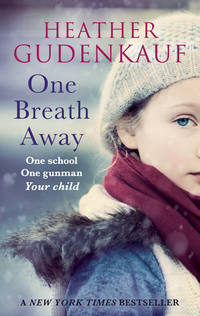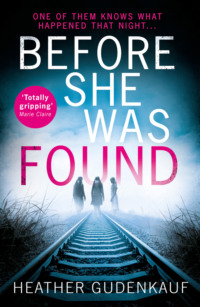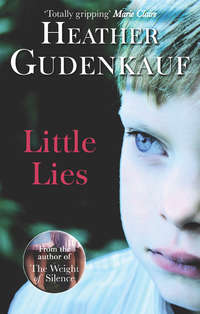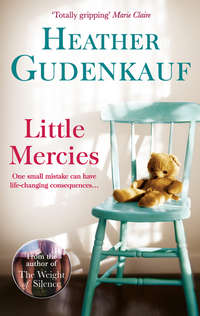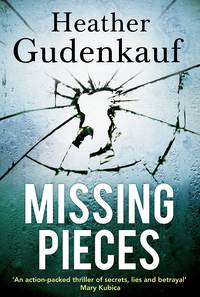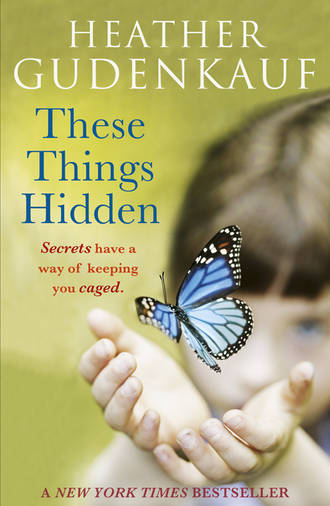
Полная версия
These Things Hidden
I’m afraid to find out how five years in prison have changed Allison. She has always been so beautiful and sure of herself. What if she isn’t that same girl who could stare down Jimmy Warren, the neighborhood bully? What if she isn’t the same girl who could run eight miles and then do one hundred sit-ups without breathing hard?
Or worse yet, what if she is the same? What if she hasn’t changed at all?
Allison
I don’t even think my sister knows that I’m being released from prison. Two years into my sentence, after she graduated from high school, she left home and moved two and a half hours north of Linden Falls to New Amery, where our dad grew up. She lives with our grandma. Last I heard, she was attending a community college there, studying something called Companion Animal Science. Brynn’s always loved animals. I’m glad she chose something that suits her. If my parents had their way, she’d slide into the vacancy I created and be in law school.
Brynn still won’t answer my letters or talk to me on the phone when I call her at Grandma’s house. I mean, I get it. I understand why she wants nothing to do with me. If I were in her shoes, I probably would have done the same thing. But I don’t think I could have stayed away from her this long. For five whole years, she has ignored me. I know I took her for granted, but I was just a kid. For how smart I was, I knew absolutely nothing. I understand the mistakes I made; I just don’t know how to bring my sister back to me, how to make her forgive me.
During the drive to Linden Falls, Devin and I don’t talk much but that’s okay. Devin wasn’t all that much older than I was when my parents hired her to represent me. Fresh out of law school, she came to Linden Falls because her college sweetheart grew up there and they were going to get married and open a law practice together. They never ended up getting married. He left, she stayed. If it wasn’t for Devin, I could have been in jail for much, much longer. I owe her a lot.
“You have a start at a whole new life, Allison,” Devin tells me as she merges onto the highway that crosses the Druid River and leads into Linden Falls. I nod but don’t say anything. I want to be excited, but mostly I feel scared. Driving into the town where I was born and grew up makes me feel dizzy, and I clasp my hands together to keep them from shaking. Waves of memories wash over me as we drive past the church we attended every Sunday, past my elementary school and past the high school that I never graduated from. “You okay?” Devin asks me again.
“I don’t know,” I tell her honestly, and I lean my head against the cool glass of the window. We continue on in silence, past St. Anne’s College where I met Christopher for the first time, past the street where we would turn if we were going to the house I grew up in, past the soccer complex where my team won the city championship three years in a row. “Stop,” I say suddenly. “Please, pull in here.” Devin steers her car into the soccer complex and parks next to a field where a group of young teenage girls are booting a soccer ball around. I climb from the car and watch on the sidelines for a few minutes. The girls are completely engrossed in the game. Their faces are red from the heat and their ponytails are drenched with sweat.
“Can I play?” I say. It comes out softly, shyly. It doesn’t sound like me at all. The girls don’t even notice me and continue on with their game. “Can I play?” I say again, this time more forcefully, and a short, solid girl with her brown hair pulled back in a headband stops and looks me up and down skeptically. “Just for a minute,” I say.
“Sure,” she answers, and trots after the ball.
I step cautiously onto the field. The grass is a deep emerald-green and I bend down to touch it. It is soft and wet from the earlier rainstorm. I begin to run, slowly at first, then I pick up the pace. I’ve tried to stay in shape while in jail, running laps inside the fenced courtyard, doing push-ups and sit-ups in my cell. But the soccer field is at least one hundred yards long and very quickly I become winded and have to stop. I bend over, hands on my knees, my muscles already aching.
The girls head back my way, their skin tan and healthy in comparison to my own white skin that has seen so little of the sun. Someone passes me the ball and everything comes back, the familiar feel of the ball between my feet, the instinct of knowing which way to move. I dart between the girls, dribbling and passing the ball down the field. For a minute I can forget that I’m a twenty-one-year-old ex-con whose life has already passed her by. A girl chips the ball to me and I weave in and out of the crowd of players and break away. With no cleats, I slip slightly in my cheap tennis shoes but quickly regain my balance. The midfield defender is approaching and I feint left, leaving her behind, and send a square pass to the girl with the headband. She launches the ball over the shoulder of the goalie and into the goal, and the girls erupt in celebration. For a minute I can imagine that I’m a thirteen-year-old, playing a pickup game with my friends, and I’m smiling and laughing, wiping the sweat from my forehead.
Then I look over and see Devin waiting patiently for me on the sidelines, an amused expression on her face. I must look silly, a grown woman dressed in khaki pants and polo shirt, playing soccer with a bunch of kids.
“You’re a natural,” Devin says as we walk back to her car.
“Yeah, a lot of good that does me now,” I answer with embarrassment, glad that my face is already red from my workout.
“You never know,” Devin responds. “Come on, we have a little bit of time left before they’re expecting us at Gertrude House. Let’s get something to eat.”
As Devin pulls up in front of the halfway house where I will be staying for the next six months, it begins to rain again. It is a huge Victorian, with peeling white paint, black shutters and a porch lined with white spindles. “I didn’t think it would be so big,” I say, looking up at the house. It would be scary if it weren’t for the beautifully landscaped front yard.
“It has six bedrooms, with two or three women to a room,” Devin explains. “You’ll really like Olene. She started Gertrude House about fifteen years ago. Her own daughter died after getting out of prison. Olene felt that if Trudy had had a place to go to after she was released from jail, a court-mandated place, she would still be alive today. So she opened Gertrude House as a way to try and educate women on how to live successfully after prison.”
“How did she die?” I ask as we get out of the car and walk to the front door.
“Trudy refused to move back home with her mother. Instead, she moved in with the boyfriend who’d got her hooked on drugs in the first place. She overdosed three days after she got out of jail. Olene found her.”
I don’t know what to say to that, so we move out of the rain and onto the porch in silence. Devin knocks on the front door and a woman of about sixty, wearing a shapeless denim dress, appears. She is slim, with closely cropped silver hair, and has tanned, leathery skin. She looks like a withered orange carrot left too long in the crisper.
“Devin!” she exclaims, wrapping her in a tight hug, her silver bracelets clinking against one another on her thin wrists.
“Hi, Olene,” Devin says with a laugh. “It’s always good to see you, too.”
“You must be Allison.” Olene releases Devin and takes my hand in hers. It is warm and her grip is strong. “It’s so nice to meet you,” she says in a low, gravelly voice. A smoker’s voice. “Welcome to Gertrude House.” Her green eyes never leave my face.
“Nice to meet you,” I answer, trying to meet her gaze.
“Well, come on in. I’ll give you the grand tour.” Olene steps into the foyer. I look at Devin, a flurry of panic rising in my chest, and she gives me an encouraging nod.
“I’ve got to get back to my office, Allison. I’ll give you a call tomorrow, okay?” She sees the worry in my face and leans in to hug me. Even though I keep my body rigid and tense, I am grateful for the touch. “Bye, Olene, and thank you,” Devin calls. To me, she says, “You hang in there. Everything is going to be okay. Call me if you need anything.”
“I’m fine,” I say, more to assure myself than Devin. “I’ll be fine.” I watch as she walks quickly down the porch steps and back to her car, off to live her life. That could have been me, I think. I could be wearing the gray suit, driving clients around in my expensive car. Instead, I’m carrying a backpack filled with everything I own and moving into a house with people who, in my other life, I would never give the time of day. I turn back to Olene. She is examining me carefully, a look of something I can’t quite identify on her face. Pity? Sadness? Remembering her daughter? I don’t know.
She clears her throat, a raspy, wet sound, and continues the tour. “We currently have ten residents staying here—eleven, now that you’ve joined us. You’ll be sharing a room with Bea. Nice woman. This used to be a library.” Olene nods toward a large, square room to the left. “We use it as our meeting room. We gather here every evening at seven. This is the dining room. Dinner’s at six sharp. Breakfast and lunch, you’re on your own. The kitchen is just through there—I’ll take you in when we’re done with the tour. Like most homes, the kitchen is the heart of Gertrude House.”
Olene is moving more quickly now and I have to focus on keeping up with her instead of stopping and taking in each of the rooms individually. After my plain prison cell, Gertrude House is an overwhelming assault on the senses. There are brightly painted walls, paintings and photos, furniture and knickknacks everywhere. Music is playing in a far-off corner of the house and I think I hear a baby crying. At my questioning look, Olene explains. “Family members can visit. You hear Kasey’s baby crying. Kasey is leaving us next week. Going back home to be with her husband and children.”
“Why is she here?” I ask as Olene leads me to what appears to be a family room.
“At Gertrude House, we don’t focus on one another’s crimes. We try to zero in on what we can do to make everyone’s lives better and try to help the other residents reach their goals. That said—” Olene acknowledges with a shake of her head “—word travels quickly around here and you’ll get to know one another quite well.”
I’m suddenly very tired and wonder if Olene will take me to my room soon. I just want to crawl under the covers and sleep. We pass a short, heavy woman with waist-length black hair and several piercings in her nose and lip. “Allison, this is Tabatha. Tabatha, this is Allison Glenn. She’s bunking with Bea.”
“I know who you are.” Tabatha smirks, tossing her hair over her shoulder as she lifts a large bucket filled with cleaning supplies. I never really thought I could keep the reason I was sent to jail a secret, but I would much rather have been known as the girl who stole cars or snorted coke or even been the one to whack her abusive husband than who I really am.
“Nice to meet you,” I say, and Tabatha gives a snort so loud I expect the force will cause one of her nose piercings to fly out and hit me on the chest. I think of my friend Katie and almost laugh. When we were fourteen, she got her naval pierced without her parents’ knowledge. By the time she showed it to me, it was oozing and infected. I tried to help her, but she was ticklish and started to squirm every time I went near her stomach. Brynn walked in while I was helping her clean it up and we couldn’t stop laughing. Every time Brynn and I saw someone with unusual piercings, we’d get the giggles.
I decide to ignore Tabatha and turn to Olene. “Are we allowed to use the phone here? Can I call my sister?”
Brynn
I hear the ring of the phone and my grandma calls, “I’ve got it!” A minute later she comes into the kitchen, where I’m making a sandwich. I see the look on my grandma’s face and I know this has something to do with Allison. “It’s your sister,” she says. Already I’m shaking my head back and forth. “Brynn, I think you should talk to her.”
My grandma is trying to sound stern, but I know she’ll never force me to speak to her. “No,” I say, and go back to spreading peanut butter on my bread.
“You’re going to have to talk to her sooner or later,” she says patiently. “I think you’ll feel better.”
“I don’t want to talk to her,” I say firmly. I can’t get angry with my grandma. I know she’s caught in the middle. She wants what’s best for the both of us.
“Brynn, if you don’t talk to her on the phone, don’t answer her letters, Allison is going to find another way.”
All of a sudden, it’s clear. I see it in her old, kind blue eyes. Allison is getting out of jail. For all I know, she might be out already.
My hands begin to shake and a glob of peanut butter drops from my knife to the floor. I’m afraid she is going to show up here unexpectedly. I’ll be in the backyard, training my German shepherd-chow mix, Milo, to walk past a treat without eating it and I’ll turn around and there she’ll be, looking at me. Waiting for the words that I know won’t come. What could I possibly have to say to her? What more could she say to me that she hasn’t already said in her letters? How many ways can someone say they’re sorry?
I bend down to wipe up the peanut butter with a paper towel, but Milo gets to it before I do. “I can’t talk to her.”
My grandmother presses her lips together and shakes her head in defeat. “Okay, I’ll go tell her. But, Brynn, you’re going to have to face her sometime.” I don’t answer, but follow her into the living room and watch as she picks up the phone.
“Allison?” My grandma’s voice trembles with emotion. “Brynn can’t come to the phone.” There’s a pause as she listens. “She’s doing great … just great …”
I can’t stand it anymore; I hurry back to the kitchen, grab my sandwich and leave out the back door to my car. Animals are so much easier to deal with than people. I learned that a long time ago. My parents never let me have a pet—too furry, too messy, too time-consuming. Every time I brought home strays, I would hope, pray, that they would let me keep them. Just once. I tried to spiff them up—I smoothed their tangled fur with an old comb, spritzed their fur with body spray, scrubbed their teeth with an old toothbrush. Ancient, arthritic mutts, one-eyed cats with notched ears. I would parade them in front of my parents. See how good he is? See how soft her fur is? See how tame, how sweet, how smart? See how lonely I am? Do you see? But no. No pets allowed. My dad would take me to drop the animal off at the shelter and every time I would cry and hold so tight to the animal that it would claw and scramble to get away from me.
My grandmother lets me have animals in her house, though she has drawn the line at five. We have two cats, a mynah bird, a guinea pig and Milo. Grandma said enough is enough, that she doesn’t want to turn into one of those dotty old cat ladies that animal control has to come out and visit.
I’m training Milo to be a therapy dog. He’s learning how to sit-stay or down-stay for thirty seconds and to come when he’s being called. Grandma is helping me to teach him how to sit quietly by, when two people are arguing. We make up silly fights about whose turn it is to take out the garbage or make dinner. I think Milo knows we’re not really serious; he just yawns and lies down and looks back and forth at us until we both start laughing. When we’re finished with the training I hope to be able to take Milo into nursing homes and hospitals. It’s a proven fact that animals are able to help ease pain and anxiety in the sick and elderly. One day I want to open my own business, training animals for pet therapy. For once in my life I’ve got a plan. A good one, for that matter. I don’t want anyone or anything to distract me from my goal. Not my parents and certainly not my sister.
If only Allison had done what she always did—made the right choice—things could have been so different. She wouldn’t have had to go away. Our parents would have been happy and I could have just faded into the background where I belong. But she didn’t. She screwed up royally, and she left me in that house alone with our parents.
I wasn’t the perfect girl like she was, and I never will be. Oh, but they tried. All through high school, it was pressure, pressure, pressure. Staying in that house, I couldn’t get my thoughts straight, couldn’t make a decision, couldn’t breathe. I tried to go to St. Anne’s College, tried to keep up with my classes, tried to make friends, but whenever I walked into the classroom a wave of panic would come over me. It always started in my ears, a strange buzzing sound that would trickle down my throat and out toward my fingertips, leaving them numb. My chest would tighten; I couldn’t catch my breath. The instructors and students would gawk at me and I would stare back until they seemed to melt before my eyes. Their ears would slide down their cheeks, their lips would dribble down their chins, until they were nothing but fleshy puddles.
It wasn’t until I swallowed a bottle of sleeping pills that I found in my mother’s medicine cabinet that my parents finally decided to leave me alone. They gladly sent me over the river and through the woods to Grandmother’s house with a suitcase and a prescription for an antidepressant.
Things feel right here. Grandma got me to go to a doctor; I took my medicine and it got me back on track. I’m doing fine. But I won’t talk to Allison. I can’t talk to her. It’s better this way. Better for her and better for me.
For once in her life, Allison got what she deserved.
Allison
I set the receiver back into its cradle, all the while knowing that Olene is watching me carefully with her quick, birdlike eyes. Once I get settled and find a job, one of the first things I’m going to buy is a cell phone so I can have a little privacy when I talk. I’m sure my parents would buy me a phone, but I don’t want my first interaction with them to be about money. Besides, I want to show them that I’m going to be okay, that I can take care of myself. I wonder if they are thinking about me right now. Secretly, I had hoped they would have been parked in front of Gertrude House to welcome me when I arrived.
Olene must be psychic, because she says, “Many of the residents have cell phones, but we have guidelines here that phones need to be turned off while doing chores or when we are having group sessions. We want to respect others’ need for quiet.”
Olene picks up where she left off with the tour. She leads me through the kitchen, where we will take turns making dinner, and to an octagonal room with a ceiling that extends above the second floor. This is where the residents watch television. A gray-haired woman wearing a waitress uniform is dozing on a sofa and a young, petite, dark-skinned woman is holding a toddler on her lap and singing softly to him in Spanish. The television is tuned to a soap opera, the volume muted.
“This is Flora and her son, Manalo,” Olene says in a whisper. “And that’s Martha.” Olene waves a hand toward the slumbering woman. Flora’s eyes narrow into suspicious slits and she gathers Manalo more closely to her. The little boy waves a chubby hand at us and grins.
“Nice to meet you,” I say.
Flora speaks rapidly to Olene in Spanish, her tone tight and hostile, and Olene responds back in Spanish, as well. I have the feeling that Olene is going to have to do a lot of talking to calm the other residents of Gertrude House when it comes to me.
“Let’s go on upstairs and I’ll show you your room,” Olene says, taking me by the elbow and steering me from the television room to the spiral staircase that leads to the bedrooms. I can feel Flora’s eyes on my back as I follow Olene up the steps. I’ve been here for all of twenty minutes and everyone already seems to know who I am and what I’ve done. I know I shouldn’t let it bother me so much, I had to deal with the same things in jail, but this seems different somehow.
“The expectation is that everyone takes an active role in the upkeep of the house,” Olene says, and I can see this is true. There isn’t a speck of dust anywhere and the floors gleam. Olene gently knocks on a closed door before opening it to reveal a small room with bunk beds and two small dressers. The beds are made up with blue and white floral comforters and thick, soft pillows. Another rush of exhaustion overtakes me and I want to go lie down. The walls are painted sky-blue and there are crisp, white curtains covering the windows. It’s a very peaceful room.
“Your roommate, Bea, is at work right now. She’ll be home in a few hours. Why don’t you unpack your things, get settled and I’ll come back in a little while and we can finish the orientation.” I look at the bunk beds and hesitate, wondering which one is mine. “You get the bottom bed,” Olene says. “Bea likes to sleep on the top bunk—she says that the bottom bed makes her feel claustrophobic.”
Olene pats me on the arm as she moves to leave the room. “Olene,” I say. She turns back to me, and I’m stricken by how kind her worn face is. “Thank you.”
“You’re welcome.” She smiles. “Get a little rest and holler if you need anything.”
My few belongings fit into one drawer of my bureau with room to spare. In a way, Gertrude House reminds me of the summer camp I attended when I was eleven. I share a room with bunk beds and, from what Olene has said, we follow a very specific schedule that is posted in the main gathering area. From the moment we wake up at five-thirty to lights out at ten-thirty, our day is filled with chores, and group sessions on everything from managing finances to anger management to mastering interview skills.
I sit on the lower bunk and bounce a bit. The springs are firm but giving. This feels like a real bed, not like Cravenville’s hard, institutional slab, with rough, scratchy sheets that smelled of bleach. I lift a fluffy pillow and bury my nose in it. It smells of lavender and I feel tears prick at my eyes. Maybe it won’t be so bad here. It couldn’t be any worse than jail. Maybe the other girls will learn to like me. Maybe my parents will forget about what the neighbors think and welcome me as their daughter again. And maybe, just maybe, Brynn will forgive me.
I inhale deeply one more time and lower the pillow from my face and that’s when I see it. Its blank eyes stare up at me and its smudged plastic face is frozen in a half smile. I pick up the baby doll. It’s old and battered and looks like it came out of a Dumpster. Across the doll’s bare chest is one word, slashed in black permanent marker, a word that I now know will follow me everywhere, no matter where I go. Killer.
Claire
Bookends is dim and quiet. A sudden Sunday afternoon rainstorm has driven away the stifling August heat and all of the customers. As Claire Kelby unpacks a box of books, Joshua pokes his head up from behind the counter, his yellow hair standing on end. She tamps down the desire to lick her fingers and smooth the flyaway strands. His dark brown eyes look expectantly up at her.
“Can I help you, young man?” Claire asks her son in mock seriousness.
“I’m bored,” Joshua answers dismally, and kicks his sneakered foot against the front of the counter.
“You’ve read every single book back there?” Claire asks him, and Joshua glances over his shoulder toward the shelves and shelves of books. Looking back at his mother, he nods and tries to bite back a smile.
“Uh-huh,” Claire says skeptically. “Where’s Truman?”
“Sleeping,” Joshua grouches, drawing his eyebrows together. “Again,” he adds about their six-year-old red-brindled English bulldog.
“I don’t blame him. It’s a rainy day, good napping weather,” Claire responds. “Do you want to help me? I’ve got lots of boxes to open and books to shelve before we close. Or maybe you want to take a nap, too?”
“I’m not tired,” Joshua says stubbornly, though his eyes are heavy. “When’s Dad going to get here?”
“He’ll be here soon,” Claire assures her son, and leans over the counter to place a kiss on his blond head. She looks around the bookstore that has been both a refuge and a yoke. Years ago, the store and its responsibilities had kept her sane. The long hours had kept her mind busy, kept her focused, distracting her from the knowledge that her body, which had served her so well over the years, had ultimately betrayed her. Sometimes this realization struck her suddenly, squeezing so tightly she would have to stop whatever she was doing—helping a customer, unpacking books, answering the phone—and deliberately pry away the fingers of anxiety that clutched at her heart until she could breathe again.


